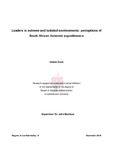
Antarctic Legacy Archive
Leaders in extreme and isolated environments: perceptions of South African Antarctic expeditioners
- ALSA Home
- →
- Documents
- →
- SANAP Thesis
- →
- View Item
JavaScript is disabled for your browser. Some features of this site may not work without it.
| dc.contributor.author | Koch, Daleen | |
| dc.date.accessioned | 2023-01-18T07:29:39Z | |
| dc.date.available | 2023-01-18T07:29:39Z | |
| dc.date.created | 2016-12 | |
| dc.identifier.uri | http://hdl.handle.net/123456789/29107 | |
| dc.description.abstract | The South African National Antarctic Program appoints a station leader to lead a multidisciplinary team, comprising ten to thirty individuals, who spend twelve months or more at one of three remote research stations: Gough Island, Marion Island or SANAE. The extreme, isolated and confined environments encountered at Antarctic stations provide unique challenges to management and leadership.The purpose of this study was to explore the perceptions that South African Antarctic expeditioners have concerning various aspects of leadership at the remote stations. The study explored whether the perceptions of men and differed, whether perceptions changed with more expedition experience, and whether the perceptions changed for teams that had experienced emergencies, evacuations, serious illness, death or constant and aggressive interpersonal conflict. The analysis showed that an effective station leader maintains a personal bond with individuals, maintains a balance between active and passive regulation of the emotional well-being of team members, makes an effort to create and sustain a positive team climate, and maintains a moderate involvement when it comes to team members performing their professional duties. Gender, experience and events at the station influenced perceptions of the station leader’s role in maintaining a personal bond, individual well-being, the team climate and intervention in professional duties. The most important characteristics and competencies for a station leader to possess were trustworthiness, conflict management skills and good communication skills. Expeditioners prefer an extremely participative leadership approach. During emergencies, however, it is accepted that the station leader retains decision-making autonomy. The findings in this research report were gathered from 180 returned expeditions, with an age profile between 25 and older than 61, who participated in the South African National Antarctic Program between 1961 and 2015. This research report is of value to the South African National Antarctic Program, to other National Antarctic Programs, and to space exploration missions, as well as to organisations in distress, who find themselves in environments that are harsh and unforgiving, similar to the isolated and extreme environments at an Antarctic station. Research assignment presented in partial fulfilment of the requirements for the degree of Master of Business Administration at Stellenbosch University | en_ZA |
| dc.description.sponsorship | Sponsored by the South African Department of Science an Innovation through the National Research Foundation (South Africa) | en_ZA |
| dc.language.iso | en_ZA | en_ZA |
| dc.subject | People - Teams - Overwintering Team | en_ZA |
| dc.subject | People - Teams - Team member | en_ZA |
| dc.subject | People - Teams | en_ZA |
| dc.subject | People | en_ZA |
| dc.title | Leaders in extreme and isolated environments: perceptions of South African Antarctic expeditioners | en_ZA |
| dc.type | Thesis | en_ZA |
| dc.rights.holder | Daleen Koch | en_ZA |
| iso19115.mdconstraints.uselimitation | This item and the content of this website are subject to copyright protection. Reproduction of the content, or any part of it, other than for research, academic or non-commercial use is prohibited without prior consent from the copyright holder. | en_ZA |
| iso19115.mdformat.name |
Files in this item
This item appears in the following Collection(s)
-
SANAP Thesis [1]
Doctoral and Masters thesis of SOuth african involvement in the Antarctic
